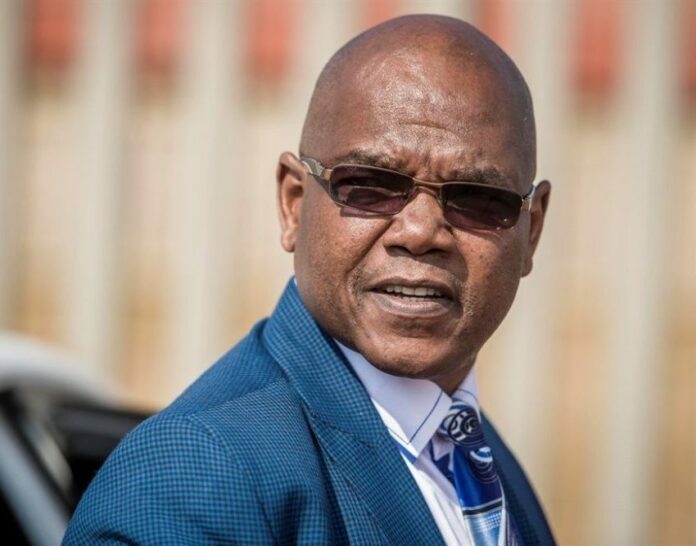Gauteng Director of Public Prosecutions (DPP), Advocate Andrew Chauke, has commended the investigating and prosecution efforts that have culminated in the jail sentence of former crime intelligence head, Richard Mdluli.
This comes after Judge Ratha Mokgoatlheng on Tuesday sentenced Mdluli and his co-accused, Colonel Mthembeni Mthunzi, to five years imprisonment.
In June 2019, the pair was convicted on charges of kidnapping, intimidation, two counts of assault with intent to do grievous bodily (GBH) harm and two counts of common assault.
This week, the two were each sentenced to three years for the two counts of kidnapping, two years for each count of assault with intent to do grievous bodily harm, and one year each for two counts of common assault.
The sentences were ordered to run concurrently, resulting in an effective sentence of five years.
The case dates back to 1999, when Oupa Ramogibe reported a case of attempted murder with the Vosloorus police station, where Mdluli was a station commander at the time.
It is alleged that Ramogibe allegedly had an affair with Mdluli’s customary wife, and married her in 1998, without Mdluli’s knowledge.
This angered Mdluli and together with his co-accused, they kidnapped Ramogibe.
In a statement on Tuesday, the National Prosecuting Authority (NPA) said subsequent to the imposed sentence, both accused brought an application for leave to appeal against the conviction and sentence, citing that the court misdirected itself, and that the conviction was based on the evidence of a single witness.
“Senior State Advocate Deon Barnard argued during their leave to appeal application in the High Court that a court of law may convict on the evidence of a single witness, and that there was no misdirection on the part of the court. [The court] holistically considered evidence presented and considered the triad factor (interest of Justice, personal circumstances of the accused, as well as interest of society) in dispensing a suitable sentence,” said the NPA.
Barnard further argued that a custodial sentence would serve as a deterrent and consolation for victims, citing that the two accused were senior police officials who abused power, leaving the victims of their crimes in a devastating state.
Judge Mokgoatlheng dismissed the application, ruling that there were no prospects of a successful appeal.
The pair were acquitted on the charge of defeating the ends of justice.
The conviction of the charge of intimidation was rescinded following the 2019 Moyo judgment of the Constitutional Court, which ruled that the Intimidation Act of 1982 was unconstitutional and deemed it invalid.
In 2011, Mdluli, Mthunzi and two others – Nkosana “Killer” Ximba and Samuel Dlomo – were charged with 16 counts ranging from murder, attempted murder, intimidation, kidnapping , assault GBH, conspiracy to commit murder and defeating and/or obstructing the course of justice.
The docket was brought to the NPA and in April 2012, following representations lodged by Mdluli to the office of the Director of Public Prosecutions (DPP) in the Gauteng Local Division, to have the prosecution against him reviewed.
Advocate Chauke took a decision to provisionally withdraw all 16 charges and referred the matter for an inquest hearing to establish the circumstances surrounding the death of Ramogibe and determine, whether or not, there was anyone who could be held criminally liable for his death.
Chauke provisionally withdrew all charges pending the outcome of the inquest hearing, so as to avoid a fragmentary trial.
In September 2012, Magistrate Jurg Viviers, who presided over the inquest hearing to establish the circumstances surrounding the death of Ramogibe, cleared Mdluli and co-accused of any involvement.
After considering the judgment, the DPP decided to withdraw the murder charge.
Freedom Under Law (FUL) approached the high court in Pretoria in a quest to set aside the NPA’s decision to withdraw the murder charges, as well as charges of fraud and corruption, withdrawn by Advocate Lawrence Mrwebi in 2011, in his capacity as Head of the National Prosecutions Service (NPS).
FUL said the decisions were irrational and Judge Murphy ruled that the NPA must reinstate the charges, and that the decision by the office of the DPP was irrational.
His decision was set aside by a full bench at the Supreme Court of Appeals (SCA), which ruled that the High Court has no authority to instruct the NPA to reinstate the charges. It said that the DPP’s decision was rational but ordered that matter be sent for a review with the office of the National Direction of Public Prosecutions (NDPP).
Chauke commended Captain Mark McLean and Advocate Barnard, and extended gratitude to retired senior counsel Advocate Zaais Van Zyl for leading this successful prosecution



